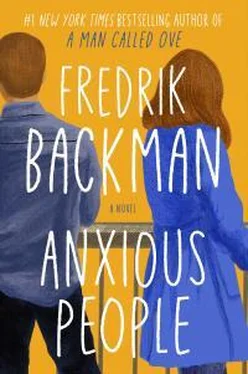“Yes, well, delivering pizzas could be an opening for communication, it certainly could. What about the bomb in the stairwell, though?” he wondered.
“It’s not a bomb!” Jack said confidently.
“Would you swear on that?”
“Using whatever swearwords you’d care to choose, and I can tell you that my mom taught me quite a lot of those. This perpetrator isn’t dangerous. Just scared.”
“How do you know that?”
“Because if he’d been dangerous, if he’d been aware of what he was doing, then he wouldn’t have ordered pizzas for all the hostages by throwing limes at us. Let me go in and talk to him, I can…” Jack paused. He’d been about to say I can save everyone . But he swallowed hard and said instead: “I can fix this. I can sort this out.”
“Have you spoken to all the neighbors?” the negotiator wondered.
“The rest of the building is empty,” Jack assured him.
The negotiator was still stuck in traffic on the motorway, far too many miles away, not even police cars were able to get through, so in the end he agreed to Jack’s plan. But he also demanded that Jack somehow get a phone into the apartment, so that the negotiator himself could call the bank robber and negotiate the release of the hostages. And take the glory when everything turns out okay, Jack thought sullenly.
“I’ve got a decent phone,” Jack said, because he had the one Jim called the special telephone thingy that got a bloody signal where there wasn’t a bloody signal.
“I’ll call after they’ve had the pizzas, it’s easier to negotiate when people have eaten,” the negotiator said, as if that were what you learned on negotiation courses these days.
“What do we do if he doesn’t open the door when we get there?” Jack wondered.
“Then you leave the pizzas and phone out on the landing.”
“How can we be sure he’ll take the phone inside the apartment?” Jack asked.
“Why wouldn’t he?”
“Do you think he’s made rational, logical decisions so far? He might get stressed and think the phone is some sort of trap.”
That was when Jim suddenly had an idea. Which surprised him as much as anyone.
“We can put it in one of the pizza boxes!” he suggested.
Jack looked at his dad in shock for several seconds. Then he nodded and said into the phone: “We’ll put the phone in one of the pizza boxes.”
“Yes, that’s a good idea,” the negotiator agreed.
“It was my dad’s,” Jack said proudly.
Jim turned away so his son wouldn’t see how embarrassed he was. He looked up local pizzerias on Google, called one of them, and explained the highly unconventional order: eight pizzas and one of the uniforms the delivery guys usually wore. However, Jim made the mistake of saying he was a police officer, and the owner of the pizzeria, who was perfectly capable of reading the local news on social media, was quick-witted enough to say that he gave a discount for bulk orders on pizzas, but charged twice as much for hiring out uniforms. Jim asked angrily if the owner was a character in an English Christmas story from the mid-nineteenth century, and the owner calmly countered by asking if Jim was familiar with the concept of “supply and demand.” When the pizzas and outfit finally arrived, Jack grabbed at them, but Jim refused to let go.
“What are you playing at? I’m the one going in!” Jack said firmly.
Jim shook his head.
“No. I still think that might be a bomb in the stairwell. So I’m the one going in.”
“Why would you go in there if you think it’s a bomb? For God’s sake, I’m going…,” Jack began, but his dad refused to back down.
“You’re certain it isn’t a bomb, aren’t you, son?”
“Yes!”
“Well, then. It doesn’t make any difference if I go in.”
“What are you, eleven years old?”
“Are you ?”
Jack tried desperately to think of a counterargument.
“I can’t let you…”
Jim was already changing clothes, in the middle of the street even though the temperature was below freezing. They didn’t look at each other.
“Your mom would never have forgiven me if I let you go in,” Jim said, looking down at the ground.
“Do you think she would have forgiven me if I let you go in, then? You were her husband,” Jack said, looking down the street.
Jim looked up at the sky.
“But she was your mom.”
There was no arguing with him sometimes, the old bastard.
50
The police station. The interview room. All the blood has drained from the real estate agent’s face now. She looks terrified.
“Ba-ba-bank robber? M-m-me? H-h-how c-c-could I…”
Jack is marching around the room, waving his arms as if he were conducting an invisible orchestra, incredibly pleased with himself.
“How did I not see this right at the start? You don’t know anything. Everything you’ve said about the apartment has been complete gibberish. No real real estate agent could be this bad at their job!”
The real estate agent looks like she’s about to start crying.
“I’m doing my best, okay? Do you have any idea how hard it is being a real estate agent during a recession?”
Jack fixes his eyes on her.
“But that’s not what you are, is it? Because you’re a bank robber!”
The agent looks in despair over at Jim in the doorway, trying to get some sort of support. But Jim merely looks back at her unhappily. Meanwhile Jack bangs both fists down on the table and glares furiously at the Realtor.
“I should have realized right from the start. When the other witnesses were talking about the hostage drama, they didn’t even mention you. Because you were never there. Admit it! We allowed ourselves to be distracted when you asked for those fireworks, and then you walked right out of that apartment, in front of our very eyes. Tell me the truth!”
51
The truth? It’s hardly ever as complicated as we think. We just hope it is, because then we feel smarter if we can work it out in advance. This is a story about a bridge, and idiots, and a hostage drama, and an apartment viewing. But it’s also a love story. Several, in fact.
The last time Zara saw her psychologist before the hostage drama, she arrived early. She was never late, but it was unusual for her not to walk in at precisely the agreed time.
“Has anything happened?” Nadia wondered.
“What do you mean?” Zara replied contrarily.
“You’re not usually early. Is anything wrong?”
“Isn’t it your job to work that out?”
Nadia sighed.
“I was only asking.”
“Is that kale?”
Nadia looked down into the plastic tub on her desk. Nodded.
“I’m having lunch.”
Other patients might have taken this as a hint. Not Zara, of course.
“So you’re vegan,” she said, without a question mark.
The psychologist coughed, the way you do if your throat takes offense at you being predictable.
“I don’t have to be, do I? I mean, I am vegan, but surely other people eat kale?”
Zara wrinkled her nose.
“But that was bought in a carryout. So you could have chosen anything. But you chose kale.”
“And only vegans do that?”
“I can only assume that lack of vitamins affects your financial judgment.”
Nadia smiled at that.
“So you look down on me because I’m a vegan, or because I pay for vegan food?”
Nadia swallowed the last bit of both the kale and her self-esteem, closed the lid of the tub, and asked, “How have you been feeling since we last met, Zara?”
Rather than reply Zara took a small bottle of hand sanitizer from her bag, carefully massaged her fingers with her back to the desk, looked at the bookcase, and declared: “For a psychologist, you have an awful lot of books that aren’t about psychology.”
Читать дальше












